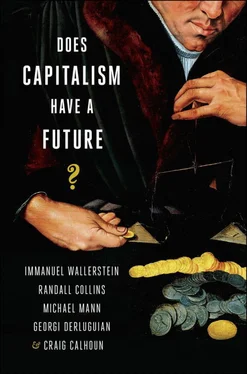The “real economy” remains depressed—if not quite “in depression.” Growth in GDP is low; unemployment remains high; new job creation recurrently fails to meet analysts’ expectations. Yet anxieties about inflation and government debt lead some to argue that the pursuit of growth must be foregone in favor of fiscal austerity. The long-term fiscal position of many US states is almost as bleak as that of Greece or Spain (despite short-term recovery in some), and though the federal government has fiscal tools states lack, it faces massive deficits without an agreement on a budget to cut or finance them in any combination. Economic discontent is a primary factor in widespread and deep political discontent. Populist anger at corrupt, self-serving, or incompetent government is linked to both more conventionally right-wing and left-wing ideologies. Weakened political legitimacy is a challenge to the continuity of capitalism.
But the developing European path seems to be neither collapse nor revolution but rather stagnation. Europe lacks growth, but still enjoys a relatively high standard of living and basically functional economic systems. There are goods in the shops (though more and more shops close). Most governments pay their bills (though they continue to cut expenditures). The dominant policy response has been austerity, the attempt to overcome deficits in state accounts. As this has had little positive effect, however prudent in the abstract and long term, politicians look more and more for growth but so far find few palatable mechanisms to produce it.
Having failed to address its financial problems as a Union, Europe faces a series of nationally structured financial crises. Yet there remain enough economic strength and political will in the EU to bail out banks and financial markets in each case. There is widespread popular discontent but so far no large-scale social movements challenging existing political parties or processes. Huge rallies and sometimes occupations in public squares signal the unhappiness but so far haven’t found a way to turn this to new political programs rather than only objections to old. Right-wing populists have seized the moment with anti-immigrant and other reactionary programs, but even though they have seen ominous growth so far they remain fringe movements, their biggest effect being to pull mainstream conservative parties to the right. Europe’s Left is barely visible unless one counts basically self-interested strikes and statist manifestoes in France. What has instead emerged is rather a series of essentially “antipolitical” movements, exemplified by Italy’s Five Star movement under Beppe Grillo but echoed in other countries where citizens vote not for more effective government but against government and especially politicians. Popular response to economic crisis and weak government legitimacy has often included right wing and xenophobic agitations.
The United States tried more pro-growth stimulus and is being rewarded with modest economic improvement: perhaps 2% growth—vastly better than Europe’s 0% to 1% but nothing to cheer about. United States prospects are improved at least temporarily by new energy resources and longer term by a more entrepreneurial economy. But the country’s dynamism is undercut by a deadlocked political process. While the Tea Party is now organized electorally mainly as a wing of the Republican Party, its roots are much more antipolitical—not unlike Italy’s Five Star movement. Its legacy pulls the Republican Right not toward different solutions so much as a resistance to compromises and thus to all available political options. The Obama administration is mainly technocratic centrist, though making its major policy innovations on a handful of liberal issues. But it has been unable to bring about a major reorientation in the wake of the crisis. In finance the same organizations remain dominant and pursue agendas largely similar to before the crisis. Some of the biggest threats to the US economy lie in deficit-ridden state and municipal governments. Cost cutting at these levels reduces the impact of federal stimulus spending, but more basically state and local governments face long-term obligations that could spell fiscal collapse unless a combination of growth and inflation reduces the burden.
Though the roots of the 2008 crisis were centered in the United States and the European Union, its effects have been worldwide. The dense interconnections and rapid flows of global capitalism and global media made it seem immediately obvious that the crisis was simply global. This was half fact and half illusion, or perhaps a distortion based on perspective. The roiling of capital markets did have far-flung effects. Plunging asset prices damaged sovereign wealth funds in Abu Dhabi and nearly bankrupted its neighboring emirate, Dubai. Exacerbated unemployment—especially among youth—may have helped to spark the so-called Arab Spring (though clearly the economic crisis can be no more than part of a more complex story). Stock markets in Shanghai, Tokyo, and Johannesburg sank with those in New York and London, though they regained ground much faster. Factory workers in China and Vietnam were laid off with sagging global demand, though after faltering briefly the Chinese and Vietnamese economies kept growing. Prices for energy and other natural resources became extremely volatile. After first falling dramatically, they recovered on demand from still growing economies like China, then in some cases sagged again as the Chinese economy did the same.
For a time, even as the United States struggled to escape a double-dip recession and Europe struggled with the sovereign debt of several member states, China, India and several other developing countries maintained rapid growth. Indeed, Chinese policymakers’ biggest concern through 2011 was not an economic downturn per se but rather “overheating,” in which economic growth outstripped supplies of raw materials, labor, and other inputs and brought hard-to-harness inflation. Since China had become one of the biggest creditors of the United States, it (like other foreign investors) had to worry about the value of its dollar-denominated assets as well as about markets for its export goods. At writing, Chinese growth continues at a rate that would thrill Europeans, but growth has slowed rapidly, proving China is not immune from the global downturn. The overheated financial markets pose one challenge. Thousands of apartments sit empty in Beijing and Shanghai, bought by speculators hoping to sell them again quickly. If growth doesn’t pick up soon, or worse, falls much below 5%, this real estate bubble could burst, bringing a downward spiral as overleveraged owners unload their holdings. This is a relatively local and contained example of systemic risk, but there are others on a much larger scale where highly leveraged financial markets are highly interconnected with each other. This is also one factor making China’s leaders fear domestic discord.
In India, capitalism is comparably vital, more entrepreneurial, and less tied to central government. The last is a blessing, because central government is considerably less effective. India has more endemic poverty and a less developed infrastructure. Inefficiency is debilitating. But its growth has been substantial and it seems to face less threat from speculative bubbles. Like China, though, its economic and political efficiency is weakened by widespread corruption. And like China it faces widespread ecological-environmental problems (though not yet anything like China’s air pollution disaster). More open to autonomous institutions, India has a more substantial range of philanthropic efforts to mitigate risk and alleviate poverty. But it faces massive inequality, and rapid urbanization presents this in newly challenging forms. State institutions to support those without the resources for market solutions remain modest.
Читать дальше












